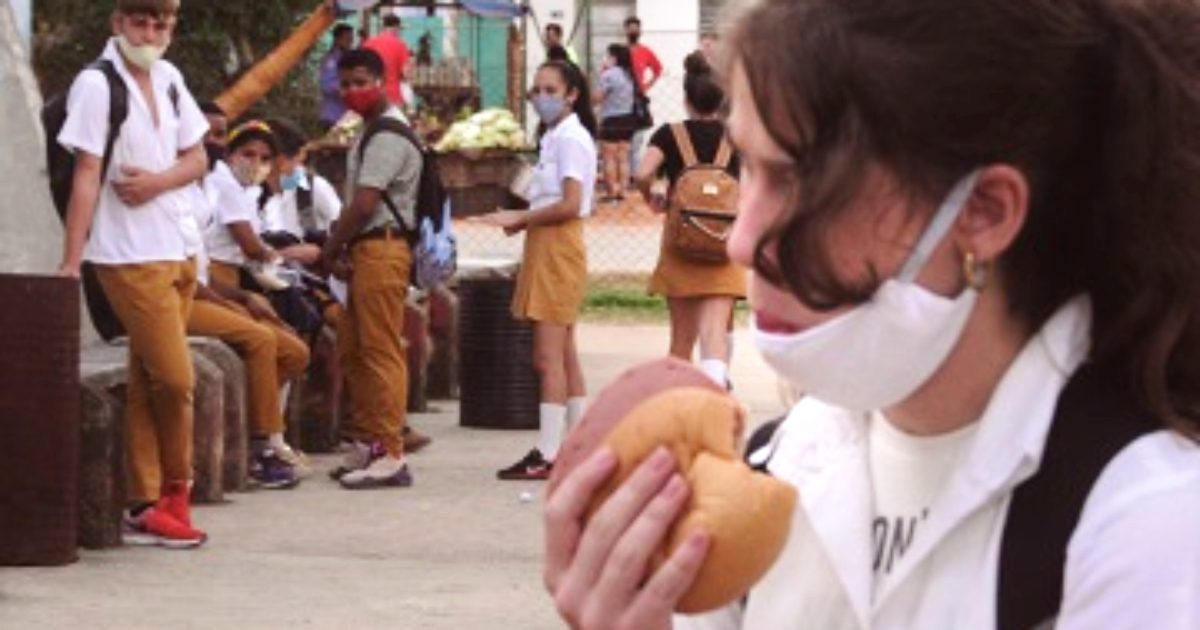In an effort to combat the reselling of school snacks among students, the authorities in the province of Santiago de Cuba have implemented a bizarre measure that has sparked controversy and concern among parents and educators. Now, Secondary School students must bite into their bread before leaving the classroom, a process supervised by the teaching staff of each institution. This action stands out as one of the many misguided attempts by Cuban authorities to address food shortages, inflation, and other symptoms of a generalized crisis that threatens large segments of the population with food insecurity.
This "solution," revealed by the independent outlet Diario de Cuba, aims to curb the widespread practice of selling bread, an activity that Santiago students have adopted to cope with scarcity and improve their economic situation. Sometimes, this is done in collusion with professors, highlighting further degeneration within the Cuban educational system.
The reselling of school snacks is a reflection of the food insecurity and the loss of purchasing power affecting Cuban families. Many students resort to selling their bread and drinks to obtain money, which they then use to cover various needs, ranging from transportation and hygiene products to entertainment and financial support for their families.
Despite being widespread, this practice is seen by many as unhygienic and detrimental to the students' health. However, students view it as an opportunity to earn income to meet their needs or contribute to their families' precarious finances.
Lisandra Ordoñez, a student at Rubén Bravo Secondary School, recounted to the cited outlet how she and her classmates began selling bread in October of last year. "At first, only our closest friends did it, then the whole group joined in. Every day, one of us receives the income from the sale," she commented.
For some students, like Liena Peñalver, this sale allows them to acquire basic products such as shampoo and hygiene items, while others, like Elder Toledano, use the money for transportation and recreational activities.
Mixed Reactions Among Parents
The measure has been met with skepticism and discontent from parents, who believe it forces students to behave in an unusual manner.
Lidia Pacheco, a mother of two teenagers, criticized the policy, stating that it "attacks the consequences and not the causes of a problem created by the economic collapse and the worsening of poverty." Other parents, like Odalis, describe it as "absurd and counterproductive."
Dr. Rafael, who has a child in secondary education, pointed out that "the damage caused by nutrient deficiencies in young people whose parents lack the money to ensure an adequate diet has multiple consequences for their future." He argued that forcing teenagers to eat their snack does not solve the underlying problem.
Since last year, the quality of school snacks has significantly declined. Nilsa, another student, explained to the cited outlet that the snack arrives late and that the bread no longer includes any accompaniment, making it unappetizing.
The lack of nutritious food in school snacks has worsened due to the flour shortage and the food crisis on the island, forcing many students to leave home with barely a bite to eat.
In 2002, a policy was initiated in secondary education to ensure adequate food conditions so that teenagers could stay in school all day.
However, the current crisis has dismantled these objectives. The school snack, which should cover 30% of the students' daily nutritional needs, has been reduced to a simple piece of bread with water, offering no significant nutritional value.
The measure of forcing students to bite into their bread to prevent reselling has highlighted the severity of the economic and food crisis in Cuba. While students seek ways to alleviate their basic needs and help their families, imposed solutions seem to miss the root causes of the problem.
Cuban Food Crisis: Frequently Asked Questions
To provide a deeper understanding of the situation and the measures being taken, here are some frequently asked questions and their answers regarding the food crisis and the reselling of school snacks in Cuba.
Why are students in Santiago de Cuba being forced to bite into their bread?
Students are being forced to bite into their bread to prevent them from reselling it. This measure aims to curb the widespread practice of selling school snacks to cope with economic difficulties.
What are the main reasons behind students reselling their school snacks?
Students resell their school snacks to earn money for basic needs such as transportation, hygiene products, and financial support for their families. This reflects the broader economic and food insecurity issues in Cuba.
How has the quality of school snacks changed recently?
The quality of school snacks has declined significantly, with students often receiving late and unaccompanied bread. This change is due to food shortages and the overall economic crisis in Cuba.
